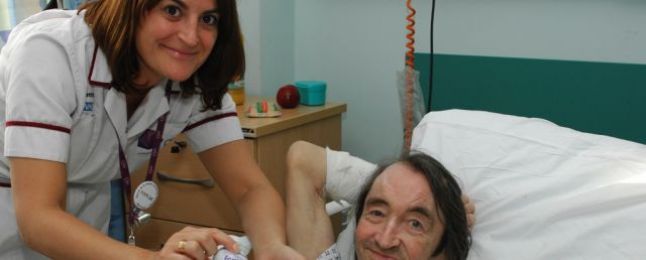
National Nutrition and Hydration Week (16-20th March). Dietetians from CSH Surrey spent the afternoon of Wednesday 18th March raising awareness among Epsom Hospital patients and staff of the importance of eating well and drinking enough in support of National Nutrition and Hydration Week.
The Dietitians talked with patients on Croft Ward about the importance of maintaining a good calorie intake and drinking enough when they are discharged.
The patients were able to try special nutritional supplement drinks, which the Dietitians also mixed with fruit juices and yoghurt and poured over cakes and scones like cream to show how the supplements could complement everyday foods.
The Dietitians also took the opportunity to share the drinks and ideas with ward staff, including nurses, healthcare assistants and speech and language therapists.
The initiative was run by CSH Surrey Dietitian, Elizabeth Dentith, with support from Gina Lawrence from Nutricia, which provides the food supplements at Epsom Hospital. Elizabeth says:
“Eating well and drinking enough is really important for good health, particularly if you’re recovering from illness or injury. Well hydrated skin helps prevent pressure ulcers from developing if someone is less mobile than usual, while eating the right foods keeps the body strong and helps it recover, for example, after surgery.
“Although the nutritional supplements come in many flavours, some patients struggle to drink the required amount every day, so we were showing patients some new ways to take the supplements and incorporate them into normal drinks and foods. This is important because if you can maintain interest and variety in food and drink, people are more likely to keep taking the supplements, which can be so important for their health and wellbeing after they leave hospital.
“We also wanted the ward teams to taste the drinks and recipes so they can talk more knowledgably with patients and families about supplements in future.”
Pippa Hart, Epsom and St Helier hospitals’ Chief Nurse, adds: “This is a fantastic opportunity to raise awareness of just how important diet and hydration can be, especially for patients in hospital and those recovering. Evidence shows that a healthy diet and keeping well-hydrated can have a huge impact on a person’s wellbeing, including faster recovery times and less chance of developing a complication. We hope that yesterday’s initiative will get people thinking more about the importance of a healthy diet and keeping hydrated.”
Avoiding dehydration in the elderly – signs to look out for and tips to follow
- Symptoms include feeling thirsty and dark coloured urine. Other symptoms can include tiredness, headaches and dizziness.
- Hot drinks such as tea and coffee do count as fluid intake, but water and milkare the healthiest. Try to avoid alcohol and sugary and fizzy drinks as these can be high in added sugars.
- Plain water can be hard to drink – adding sparkling water, a slice of lemon or adding squash can be useful ways to add flavour to water. Warm or hot water can also be nice.
